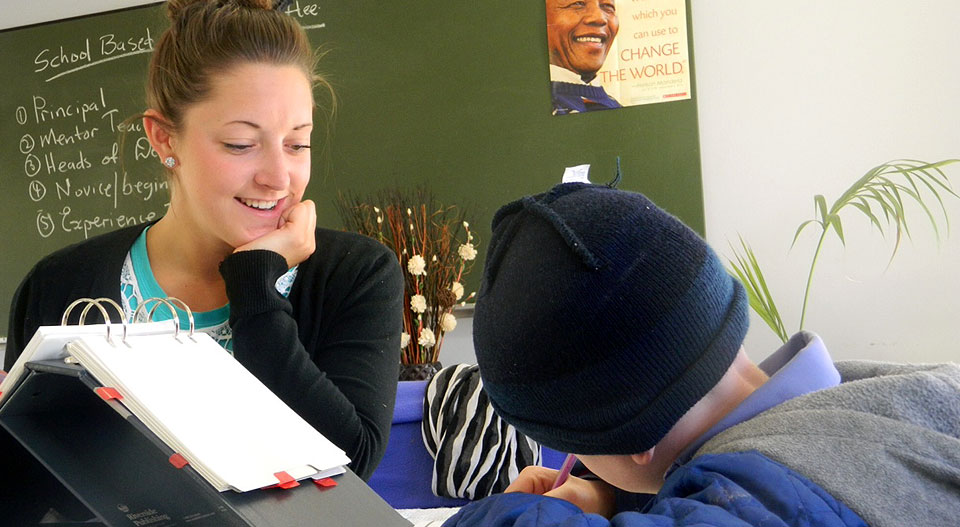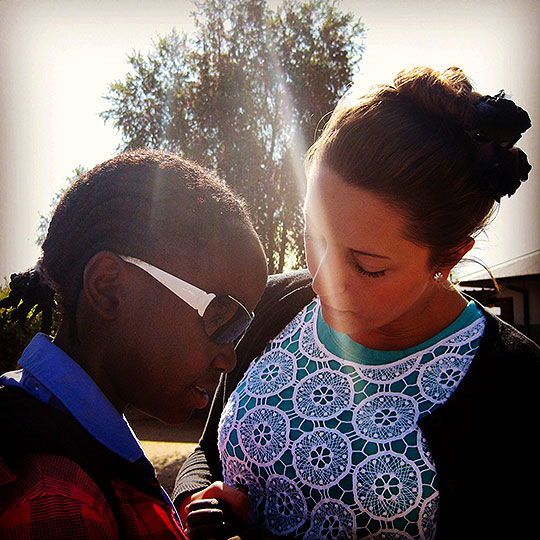

To be honest, it has been an emotional few days at National Institute for Special Education (NISE). The learners are still a little riled up from their long weekend (“out weekend”) and the teachers are becoming accustomed to having us around, but today we got to see, for the first time, the depths of some of our students’ struggles. Some of the learners were able to go home over the weekend. This obviously means that some of the students didn’t get to go home to their families. We have come to discover that they may not have families to visit at home due to lack of parental involvement, the “inconvenience” of feeding another mouth, or the “shame” of having a child with a disability. It is disheartening but is a reality for a lot of students at NISE. Some celebrated Father’s Day while others spent the weekend with their sister’s family and told they aren’t allowed back.
 The hardest lesson that I am struggling to learn is that sympathy is not an attribute to have when working with people with disabilities. Empathy, yes, but not sympathy. It is so easy to feel bad for these Namibian learners because they can’t see, or because they are not in contact with their families. However, it gives a sense of helplessness, not helpfulness. Hardships are reality and this is the reality these learners face each passing day. I am still working on removing my personal emotions and delving deeper into finding resources and means of expression that can help these learners succeed. I am still reminding myself that patience is important, but so is persistence. I am still finding means to self cope, even when students’ stories break my heart.
The hardest lesson that I am struggling to learn is that sympathy is not an attribute to have when working with people with disabilities. Empathy, yes, but not sympathy. It is so easy to feel bad for these Namibian learners because they can’t see, or because they are not in contact with their families. However, it gives a sense of helplessness, not helpfulness. Hardships are reality and this is the reality these learners face each passing day. I am still working on removing my personal emotions and delving deeper into finding resources and means of expression that can help these learners succeed. I am still reminding myself that patience is important, but so is persistence. I am still finding means to self cope, even when students’ stories break my heart.
We have begun administering the Woodcock Johnson III Tests of Achievement (WJIII). Professor Caro administered the first series of 12 tests to a student in grade 1 who has been observed to be behind in her academics on the first day. As the coaches (Chelsea, Allyson and I) have watched the achievement tests be given in order to make observations, as well as administer the test ourselves and write upreports describing each subtest and its results. I found it interesting to view an actual child in need answer the questions. As university students at UW-Stevens Point, we practice administering the tests to peers and children who will never need these testing services. This is for test legitimacy reasons. This was a very exciting time, as my whole fall semester was designed to prepare me to administer the WJIII, score the tests, and write extensive reports regarding test results in grade equivalence and age equivalence.
I was then able to administer the WJIII to a boy, also in grade 1, after Professor Caro on the first day. I found it challenging to refrain from giving positive reinforcement after each response. It is strangely automatic but also unnecessary in excess. We are striving to give the learners more positive reinforcement and it is appropriate during some interactions whilst testing. Compliments and praise should be given in regards to hard work or giving their best guess instead of correct responses. I really enjoyed administering these tests to an actual student, as mentioned before.
This week, specifically, we are testing seven different students and writing reports unveiling the results. For the first time I am administering the test to learners who are blind. It is inspiring how hard they work and the brain power needed to do all mental math, spelling and story recall. There are only certain subtests that can be administered because many tests use pictorial cues. Our job as proctors is to determine which tests can be answered orally. It has been valuable practice to be able to administer the WJIII to students and become even more familiar with the format and questions within each subtest.
Well, that’s all for now. We have had two inspiring Peace Crops members visit our group at Arebbusch Lodge (our residence for the duration of our stay), I am learning some words in Afrikaans, and I have gulped at least 10 liters of water in the past two days. The temperature may vary by 40 degrees for the duration of the day, but the air is dry. Water is essential … so is lotion.
“Everyone is my teacher. Some I seek. Some I subconsciously attract. Often I learn by simply observing others. Some may be completely unaware that I am learning from them, yet I bow deeply in gratitude.”
-Taylor
Taylor Buresch, a senior special education major with minors in cognitive disabilities and Spanish, is blogging about her study abroad experience in Namibia, Africa.
